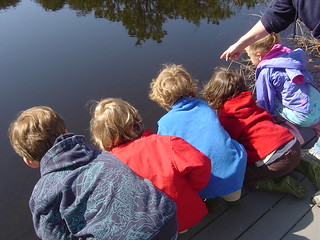Category — 1.2 Kindergarten: Cognitive Development
Cognitive Development
Most kindergarten children are very active. They love to explore their surroundings and want to learn about everything and anything (Fig. 1). But some children seem to be less active than others. This could due to individual differences in their temperament. For example, some children learn by watching and are just not as active as others. This is a very typical part of development and should not be a cause for concern for parents or teachers.
Figure 1. Exploration
However, all children at this age want to learn and grow. A passive child who does not seem to be willing or eager to learn should be watched closely. There could be a serious reason for this. It could be lack of self-esteem. It can also be an indication of a significant delay in the development of cognitive skills. It is very important that we watch young children carefully, know what they should be doing and what they are capable of doing, in order to determine whether or not a child needs help.
There are some possible signs of cognitive delays in kindergarten children. A child may:
- not be able to pay attention for more than 3 or 4 minutes;
- lose interest in an activity quickly, even if it is an activity the child enjoys;
- not know how old he or she is;
- not understand basic “cause and effect” principles (for instance, Lucy does not want to play with me because I pulled her hair);
- not have a lot of words in his or her vocabulary and may constantly refer to objects as “that thing”;
- struggle with basic spatial concepts (for example, confuse below and above and near and far);
- not recognize most basic colors (that is: blue, red, green, yellow…);
- struggle with basic classification activities (for example, not know how to group items according to size, shape or color);
- struggle with the ability to retell a story or an event;
- struggle with the sequence of events (for example, may not know what happened next, first, last);
- not be able to answer when asked: what day is it?;
- not know what the four seasons are;
- not know what the seven days of the week are;
- not ask a lot of questions, because of lack of interest or an inability to do so;
- not recognize dangerous situations;
- not understand that he or she needs to be careful around hot and sharp objects;
- not know what money is for;
- not engage in pretend play (see full Glossary) activities;
Did you know?
- Children at this age enjoy imitating others. They may pretend that they are Mom, Dad, a cat or the post man. Imitation is a very important skill (Fig. 2). Children learn a lot by pretending and imitating others. Children who do not imitate may be at a disadvantage because they are not using a basic tool that most children use to learn and grow.
Figure 2. Imitation
see References
April 2, 2012 No Comments

